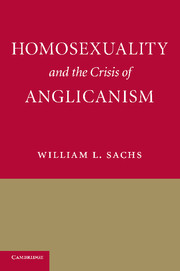Book contents
- Frontmatter
- Contents
- Acknowledgements
- 1 A definitive moment
- 2 The shape of early Christian unity
- 3 When ideals encounter realities
- 4 Reform and the power of the periphery
- 5 Anglican tradition and local prerogative
- 6 The triumph of indigenous Anglicanism
- 7 The rise of Liberalism
- 8 In search of the pure church
- 9 Beyond warring parties?
- Index
- References
5 - Anglican tradition and local prerogative
Published online by Cambridge University Press: 05 June 2012
- Frontmatter
- Contents
- Acknowledgements
- 1 A definitive moment
- 2 The shape of early Christian unity
- 3 When ideals encounter realities
- 4 Reform and the power of the periphery
- 5 Anglican tradition and local prerogative
- 6 The triumph of indigenous Anglicanism
- 7 The rise of Liberalism
- 8 In search of the pure church
- 9 Beyond warring parties?
- Index
- References
Summary
THE ADAPTIVE TASK
The Anglican split over homosexuality is often depicted as unprecedented, and some dimensions of the conflict are unique. There has not been religious division over homosexuality on a global scale. The extent to which Anglicans have formed ideological coteries threatening the Communion's unity also lacks precedent. But since the earliest years of Christianity there has been tension over matters of morality that have reflected divergent ideals of church life nurtured in different social contexts. In the fourth century such a divide resulted in the Donatist schism. Although it concerned the character of church leaders after Roman persecution, the Donatist conflict took a form that eerily resembles current division. Accusations of moral compromise by leaders prompted the rise of alternative church order. The impulse to separate on the basis of presumed moral purity that is apparent in the conflict over homosexuality has precedent.
Homosexuality was well known in the ancient world but was not the source of conflict in the church. The sort of apprehension that fuels alarm over homosexuality today surfaced throughout ancient times and later Christian history. At various points homosexuality has been strongly condemned. But the religious energies that now focus on homosexuality found other sources of alarm in previous Christian eras and other Christian contexts. Donatism has been only one among a number of such conflicts. In each case similar ideals of church life surfaced in various local settings. In comparable ways the church seemed imperiled by compromise with the world.
- Type
- Chapter
- Information
- Homosexuality and the Crisis of Anglicanism , pp. 114 - 138Publisher: Cambridge University PressPrint publication year: 2009



